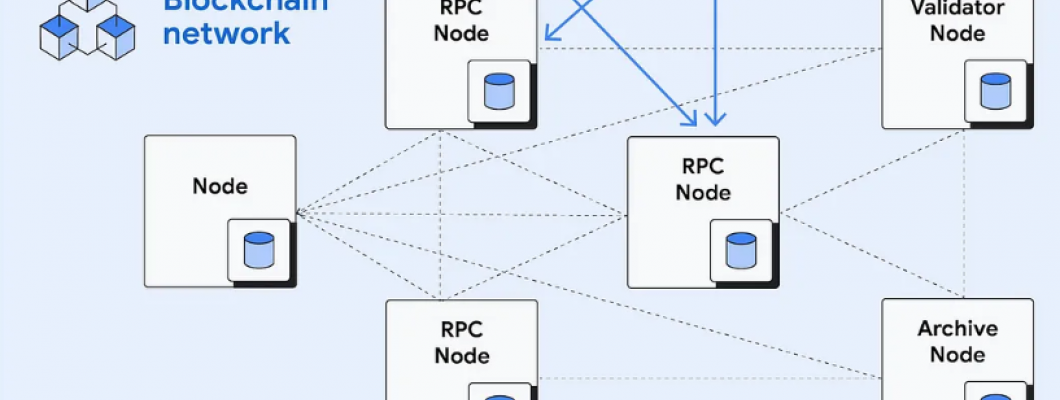
Blockchain technology thrives on decentralization, security, and transparency. At the core of this ecosystem are nodes and validators, which ensure that transactions are verified and stored securely. But what exactly are blockchain nodes and validators? How do they work, and why are they crucial for decentralized networks?
This blog will explore the different types of blockchain nodes, the role of validators, and how they contribute to the integrity of blockchain networks.
What Are Blockchain Nodes?
A blockchain node is any computer or server connected to a blockchain network. These nodes store, verify, and distribute blockchain data, ensuring the network remains decentralized and secure.
Nodes communicate with each other to maintain an up-to-date version of the distributed ledger. Depending on their role, nodes can perform different functions, from storing a full copy of the blockchain to validating new transactions.
Types of Blockchain Nodes
1. Full Nodes
Store a complete copy of the blockchain ledger
Validate transactions and blocks
Participate in the consensus mechanism (e.g., Bitcoin, Ethereum full nodes)
Help decentralize the network by maintaining an independent copy of the blockchain
✅ Example: Bitcoin and Ethereum full nodes
2. Light Nodes (SPV Nodes - Simplified Payment Verification)
Store only essential blockchain data, not the full ledger
Rely on full nodes for transaction validation
Mainly used in wallet applications for faster performance
✅ Example: Mobile and browser-based crypto wallets
3. Archival Nodes
Similar to full nodes but also store historical blockchain data
Useful for developers, researchers, and explorers to access past blockchain transactions
✅ Example: Ethereum archive nodes, used by blockchain explorers like Etherscan
4. Masternodes
Perform specialized functions like governance, privacy, or instant transactions
Do not add blocks but play a crucial role in network governance and rewards
✅ Example: Dash Masternodes, which enable private transactions and instant payments
What Are Blockchain Validators?
Validators are specialized nodes that verify transactions and maintain network security. They play a vital role in blockchain consensus mechanisms, ensuring only valid transactions are added to the blockchain.
Validators are particularly important in Proof-of-Stake (PoS) and similar consensus models, where they are responsible for proposing and validating new blocks.
How Blockchain Validators Work
Transaction Verification – Validators check transactions for correctness and ensure they follow the network's rules.
Block Proposal – Validators propose or validate blocks, depending on the consensus mechanism.
Consensus Participation – Validators reach an agreement on the next block using mechanisms like Proof-of-Stake or Delegated Proof-of-Stake (DPoS).
Network Security – By validating transactions, validators protect the blockchain from fraud and double-spending.
Consensus Mechanisms and Validators
1. Proof-of-Work (PoW) – Bitcoin & Ethereum (Pre-Merge)
Validators (miners) solve complex mathematical puzzles to add new blocks.
High energy consumption and computational costs.
Provides strong security but is slower compared to PoS models.
✅ Example: Bitcoin miners
2. Proof-of-Stake (PoS) – Ethereum 2.0, Cardano, Polkadot
Validators are chosen based on the amount of cryptocurrency they stake.
Uses far less energy than PoW.
Encourages honest participation by requiring validators to lock up funds as collateral.
✅ Example: Ethereum 2.0 Validators
3. Delegated Proof-of-Stake (DPoS) – EOS, TRON, Binance Smart Chain
Token holders vote for validators to approve transactions.
Faster and more scalable than traditional PoS.
Can become more centralized if a small number of validators control the network.
✅ Example: Binance Smart Chain validators
4. Proof-of-Authority (PoA) – VeChain, xDAI
Validators are pre-approved by a central authority.
Used for private or permissioned blockchains where trust is already established.
Faster than PoW and PoS but less decentralized.
✅ Example: VeChain Authority Nodes
Why Nodes & Validators Matter in Blockchain
✅ Security & Trust
Nodes and validators prevent fraud and double-spending, ensuring the integrity of the blockchain.
✅ Decentralization
The more nodes and validators a blockchain has, the more decentralized and resilient it becomes.
✅ Network Stability
Validators help maintain blockchain consistency and prevent forks.
✅ Censorship Resistance
A distributed network of nodes ensures that no single entity can control or shut down the blockchain.
Becoming a Blockchain Validator
1. Choose a Blockchain Network
Popular blockchains that allow staking and validation include:
Ethereum 2.0 (32 ETH required for staking)
Cardano (ADA)
Polkadot (DOT)
Solana (SOL)
2. Meet the Hardware & Software Requirements
Validators often require:
A high-performance server
Stable internet connectivity
Technical knowledge in blockchain command-line tools
3. Stake Cryptocurrency
To become a validator, you must stake a certain amount of the network’s cryptocurrency.
4. Maintain Uptime & Security
Validators need 99.9% uptime to avoid penalties or slashing, which can result in losing staked funds.
Challenges of Running a Validator Node
Technical Expertise Required
Setting up and maintaining a validator requires networking, security, and coding knowledge.
Hardware & Energy Costs
Validators need powerful machines with constant uptime to perform effectively.
Risk of Slashing
If a validator misbehaves (e.g., going offline or attempting fraud), they lose part of their staked funds.
Conclusion
Blockchain nodes and validators are essential for maintaining a secure, decentralized, and transparent network. As blockchain technology evolves, validators will continue to play a crucial role in securing transactions, verifying data, and enabling the future of Web3, DeFi, and decentralized applications.
Whether you’re an investor, developer, or enthusiast, understanding nodes and validators helps you appreciate the true power of decentralization in blockchain networks.

Leave a Comment